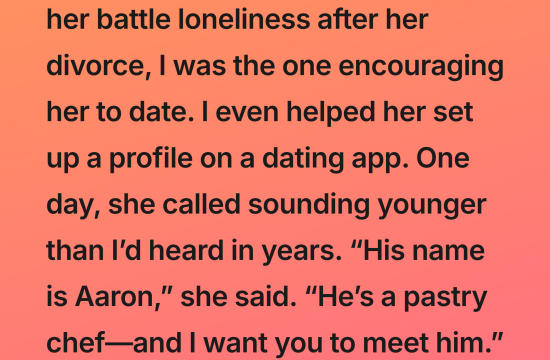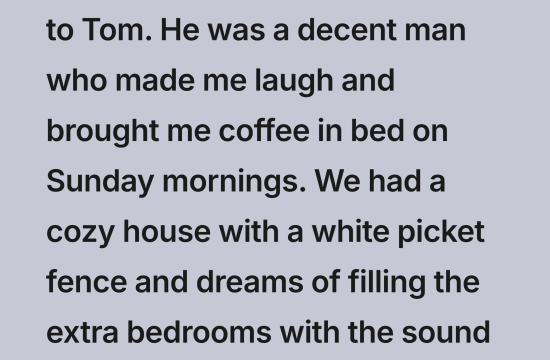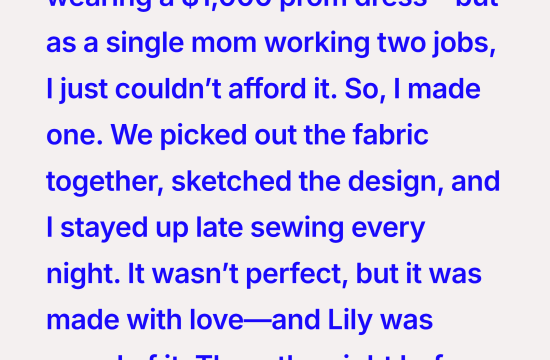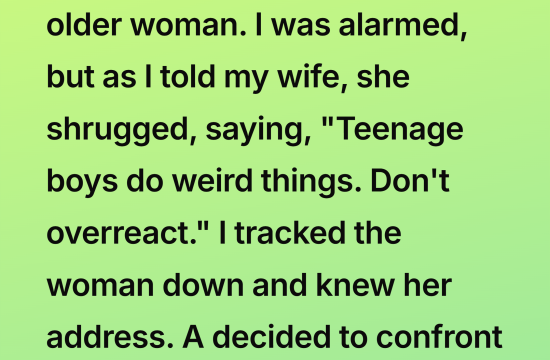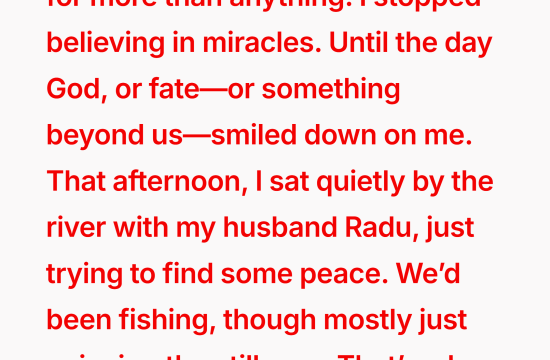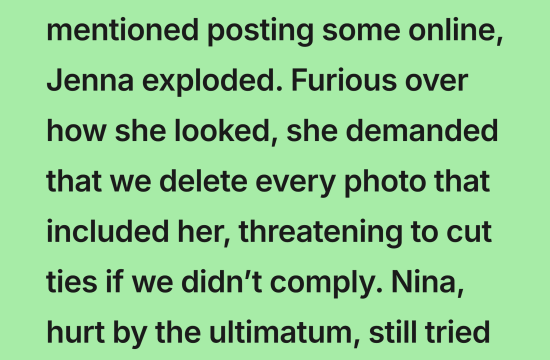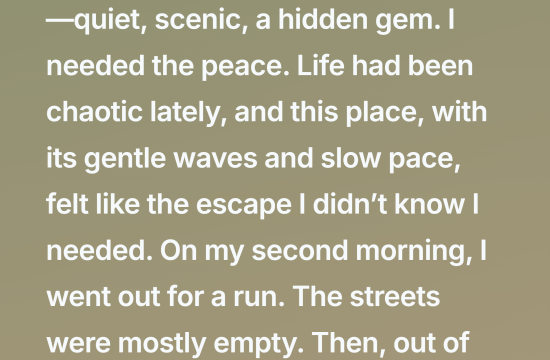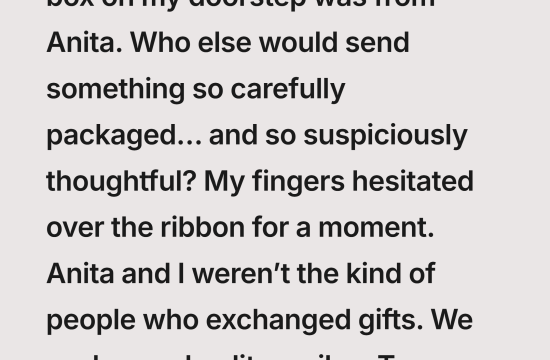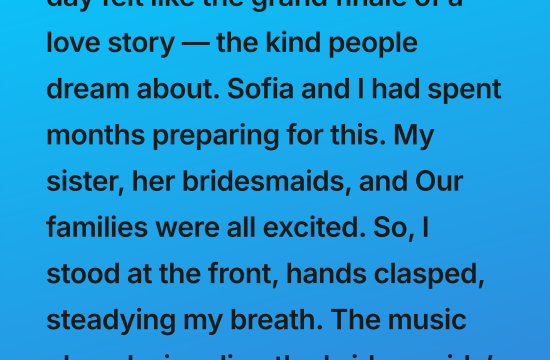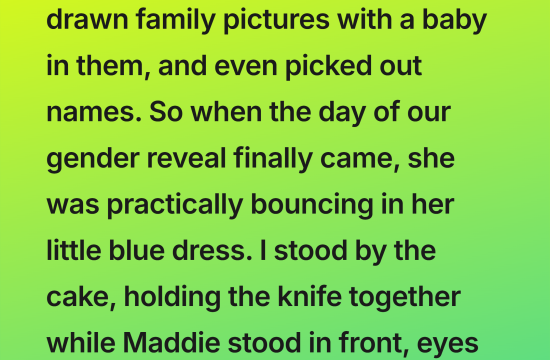I was eight months pregnant when I boarded a tram one chilly morning, my back aching, my feet swollen, my thoughts already wrapped around the tiny life growing inside me. At the next stop, a woman stepped on, cradling a newborn in one arm and a large, overstuffed bag in the other. Her shoulders sagged under its weight. Her eyes were hollow, rimmed with exhaustion, as if sleep and hope had both abandoned her long ago.
No one else moved.
So I stood and offered her my seat.
She hesitated, then sat down slowly, studying me with a look I couldn’t quite read—part confusion, part gratitude, part something that felt dangerously close to sorrow.
When the tram reached the following stop, she rose suddenly. As she passed me, her hand brushed my handbag. I felt something wet slip inside.
I froze.
What on earth…?
The tram lurched forward again. The doors slid shut. She was gone.
Heart racing, I opened my bag. My fingers closed around a soggy, crumpled envelope. It smelled faintly of spoiled milk and something sharper—fear, maybe, or despair. Inside was a handwritten note, the ink shaky and smeared, as though tears or trembling hands had blurred the words:
“Please help me. Her name is Isla. I can’t do this anymore. I saw your kind eyes. I’m so sorry.”
There was a second envelope, dry and neatly sealed. Inside lay a tiny hospital bracelet:
Isla Rawlins – Born two weeks ago
Mother: Anika Rawlins
My breath caught. Was she… was she giving up her baby to me?
Panic surged through my body and straight into my womb, and I instinctively placed a hand over my stomach, as if to calm both of us. I pressed the emergency button and told the conductor everything. By the next stop, police officers were waiting on the platform.
They took the note, the bracelet, and the infant who was now in protective care, and they escorted me to the station for a full statement. I answered questions through a fog of shock, my mind replaying the woman’s face—so young, so worn, so heartbreakingly resolved.
I went home that day shaken, trying to steady my breathing and soothe the gentle kicks of my unborn son. But I couldn’t forget Anika’s eyes. They carried the look of someone who had run out of choices.
Over the following days, restlessness consumed me. I called hospitals, shelters, social services—anywhere that might have seen a woman named Anika Rawlins with a newborn. No one had any record. It was as if she had vanished into thin air.
Then, a week later, my phone rang.
“She came back,” the officer said quietly.
“She turned herself in. And the first thing she asked was whether the pregnant woman on the tram was okay.”
That woman was me.
Anika was only twenty-two. She had been living in a shelter, hiding from an abusive partner who had tracked her down more than once. She had no family to turn to, no money, no safe place. She told the police that leaving Isla on that tram was never about abandoning her child. It was about saving her.
She said she was terrified she would go back to the man who hurt her. Terrified her daughter would grow up watching the same violence, learning the same fear. And in that single moment on the tram, when I stood and offered my seat, she felt seen—truly seen—for the first time in weeks.
In that brief, fragile instant, she trusted me.
I asked if I could meet her.
A few days later, we sat across from each other in a quiet room at the shelter. She looked smaller than I remembered, her hands trembling in her lap, dark circles still shadowing her eyes.
“You were the only one who looked at me like I mattered,” she whispered, tears spilling down her cheeks. “Not like I was a problem. Not like I was invisible.”
I cried too—not out of pity, but recognition. Loneliness like that is heavy. It presses on the chest. It steals your breath.
From that day on, I stayed close. I helped her connect with a women’s support group. I brought baby clothes and diapers. I drove her to court dates, doctor visits, counseling sessions. Sometimes I just sat with her while she rocked Isla, reminding her that she wasn’t alone.
Three weeks later, my son Elias was born.
Anika was the first person outside my family to visit us in the hospital. She stood by the bassinet, smiling softly, one hand resting on Isla’s tiny back, the other brushing my son’s blanket. Two mothers, two babies, bound by a moment neither of us had planned.
Today, Isla is two years old. She has bright eyes, a fearless laugh, and a habit of calling me “Auntie Rue.” Anika is back in school, training to become a counselor for women escaping abuse—women who look the way she once did when she stepped onto that tram, carrying everything she owned in one bag and all her hope in a single, desperate prayer.
And I often think about that seat I gave up.
It felt like such a small thing at the time. An inconvenience. A moment of courtesy.
But it wasn’t small at all.
It was a turning point—for her, for her daughter, and for me.
Sometimes kindness isn’t random. Sometimes it’s fate reaching out through the simplest act, placing two lives in each other’s path at exactly the moment they need it most.
Be kind. Even when it’s hard. Even when no one else is.
Because someone, somewhere, might be silently begging to be seen.


